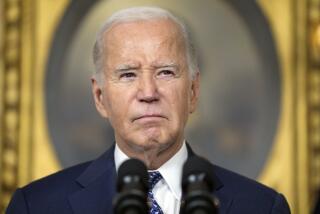Book Says Bush Sought to Stall Iraq Arms Probe : Scandal: He and Scowcroft are called driving force to keep data from Congress. Writers were given protection after threats and break-ins.
- Share via
A book to be published today contends that former President George Bush was personally involved in efforts to keep Congress from getting documents revealing the extent of U.S. assistance to Iraq before the Persian Gulf War.
Three unidentified Bush Administration officials are quoted in the book, “Spider’s Web,” as saying that Bush and his national security adviser, Brent Scowcroft, were the driving force behind the effort to keep the records from congressional committees in 1991 and 1992.
Written by Alan Friedman, an investigative reporter with the Financial Times of London, the book provides other details about the role of U.S. policy under Bush and former President Ronald Reagan in Iraq’s military buildup before the 1990 invasion of Kuwait.
Among the allegations are reports that U.S. military goods were illegally transferred to Iraq from a NATO base in Germany and that a CIA operative was deeply involved in the financing of Iraqi weapons programs by the Atlanta office of an Italian bank.
Attempts to reach Bush and Scowcroft on Sunday were unsuccessful. Both previously have denied any wrongdoing and have maintained that U.S. policy toward Iraq was aimed at moderating the behavior of Iraqi leader Saddam Hussein. The Bush White House also argued that its actions in responding to congressional requests for material were legal and simply aimed at ensuring a coordinated flow of information.
Friedman and his chief collaborator were under armed guard provided by the New York district attorney’s office in the final weeks of work on the book after two break-ins and numerous telephone threats apparently aimed at intimidating them.
“There is no doubt that they were being harassed,” said Robert Morgenthau, the Manhattan district attorney. “There appeared to be a serious threat.”
Friedman said in an interview that he and John Fielding, a producer with ABC News who assisted on the book, stayed in a secret location for three months after the break-ins and threats. He said that guards provided by Morgenthau’s office carried assault rifles and kept watch on them 24 hours a day.
The broad outline of the clandestine U.S. policy toward Hussein is well known, but the book says that Bush played a more central role than previously disclosed in the attempted concealment of embarrassing documents.
Earlier accounts have described how a group of senior officials in the Bush White House met many times in 1991 and 1992 in an attempt to restrict congressional committees’ access to sensitive documents describing the Iraq policy. Notes from some of those meetings indicated that Bush was kept informed about the attempt.
In “Spider’s Web,” Friedman says three participants in the meetings, all of whom refused to be identified, claimed that Bush and Scowcroft were “the driving force behind the efforts to keep Congress from gaining access to the Iraq-related documents.”
In addition, an unnamed former staff member of the National Security Council in the Reagan White House and a former military officer are quoted as saying that U.S. military goods were shipped to Iraq in the mid-1980s from U.S. bases and NATO stockpiles in Europe.
The shipments occurred during the Iran-Iraq War when the United States and its allies were quietly supporting Iraq. The book says that the shipments “took the Reagan Administration to the very fringes of the law,” but it stops short of charging any violation.
More to Read
Sign up for Essential California
The most important California stories and recommendations in your inbox every morning.
You may occasionally receive promotional content from the Los Angeles Times.













